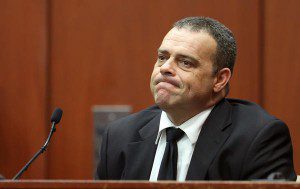
The lead investigator in the state versus George Zimmerman second-degree murder trial testified that Zimmerman’s injuries were not life threatening and he didn’t act reasonably when he shot and killed Trayvon Martin.
Called by prosecutor Bernie De la Rionda to the stand on Monday and again today, lead investigator Chris Serino of the Sanford Police Department testified that following the fatal shooting of Trayvon Martin, an unarmed black teen, on February 26, 2012, Zimmerman cooperated fully with investigators and there were few contradictions in the statements he made to law enforcement.
Serino said, he believed Zimmerman’s account of what had taken place between himself and Martin on that fateful night. Asked by defense attorney Mark O’Mara whether he believed Zimmerman’s version of events to be credible, Serino said, he did.
But De la Rionda challenged Serino on several points where he said Zimmerman had given inconsistent statements. One example was his claim that after he shot the teen he spread out his hands, although a photo taken immediately after showed Martin’s hands underneath his body.
De la Rionda then asked the judge to strike O’Mara question and Serino’s reply saying that it is improper for one witness to give an opinion on the credibility of another.
“This is an improper comment,” the judge ruled and asked jurors to disregard the statement.
Asked by O’Mara whether he believed that Zimmerman had any anger toward Martin or came across uncaring, Serino said no.
But again, De la Rionda got Serino to concede the choice of words Zimmerman used when he called the non-emergency operator, referring to Blacks as “F****** punks and “These a**holes, they always get away,” could be perceived as spiteful and derogatory.
At one point De la Rionda asked Serino whether it was against the law to wear a hoodie, based on O’Mara’s description of Martin.
“Are you saying it’s against the law for someone to wear a hoodie at night?” De la Rionda asked incredulously.
“No, sir,” he replied.
Serino said that Trayvon Martin wasn’t doing anything wrong the night he was killed. “There is no evidence to suggest he was doing anything wrong, whatsoever,” he said.
Serino also testified that he considered Zimmerman’s injuries minor. “There were injuries… I have seen a lot worse.. they weren’t life threatening.”
“You don’t get to shoot someone who punches you in the nose,” Serino said. “Zimmerman did not act reasonably when he shot and killed Trayvon Martin.”
Dr. Valerie Rao, a Medical Examiner in Jacksonville, who examined evidence in the case testified that, in terms of the defendant’s injuries they were “not life threatening and insignificant.”
Zimmerman has said his head was repeatedly slammed against the concrete by Martin when the two fought and that he killed the teen in self-defense.
“If his [Zimmerman’s] head was repeatedly slammed against concrete with great force, we would expect a lot of injuries and lacerations that would require sutures,” Rao said. She added that Zimmerman didn’t have to go to the hospital for his injuries and they were “very insignificant.”
Rao said, the preponderance of evidence would suggest that Zimmerman sustained one impact to the head.


